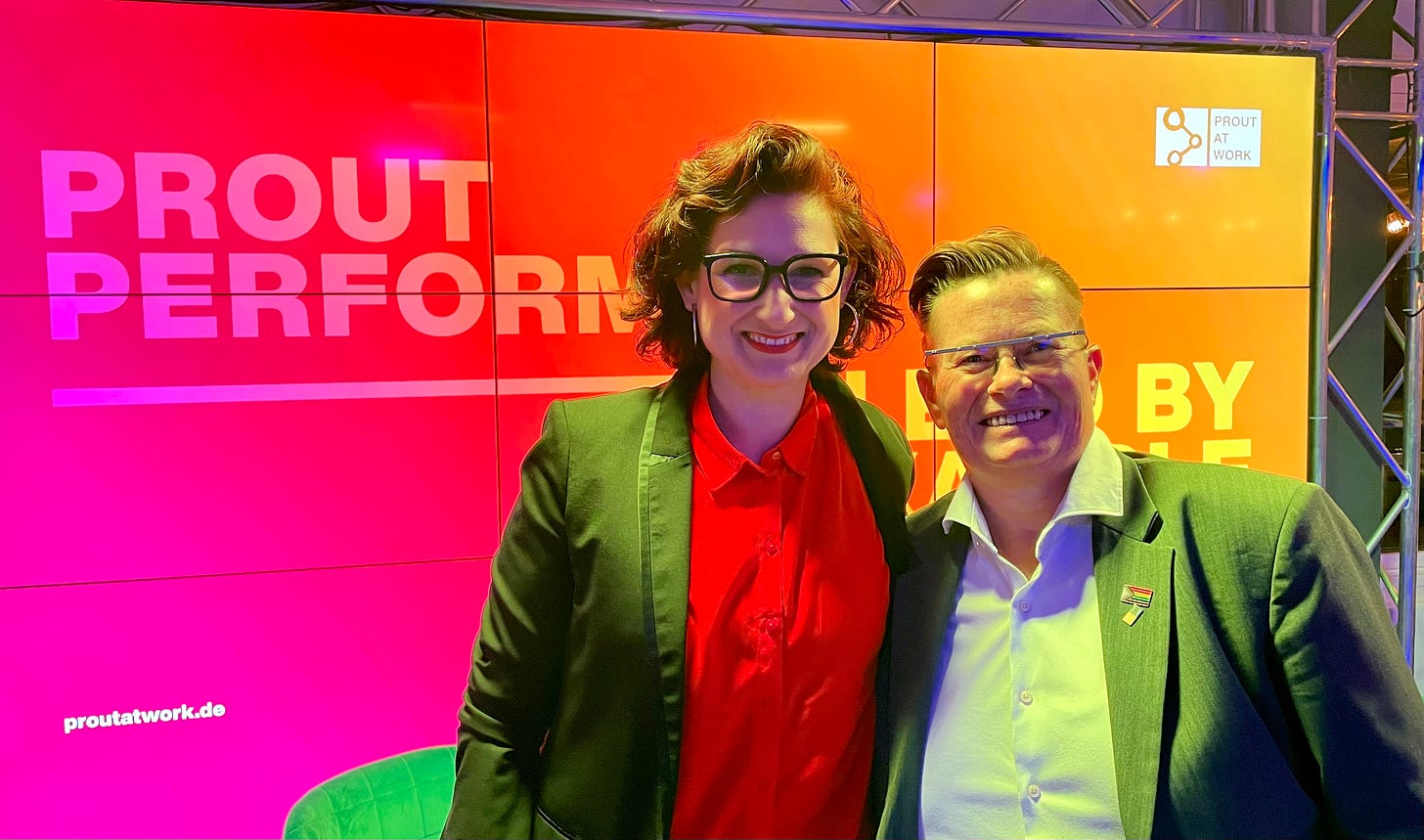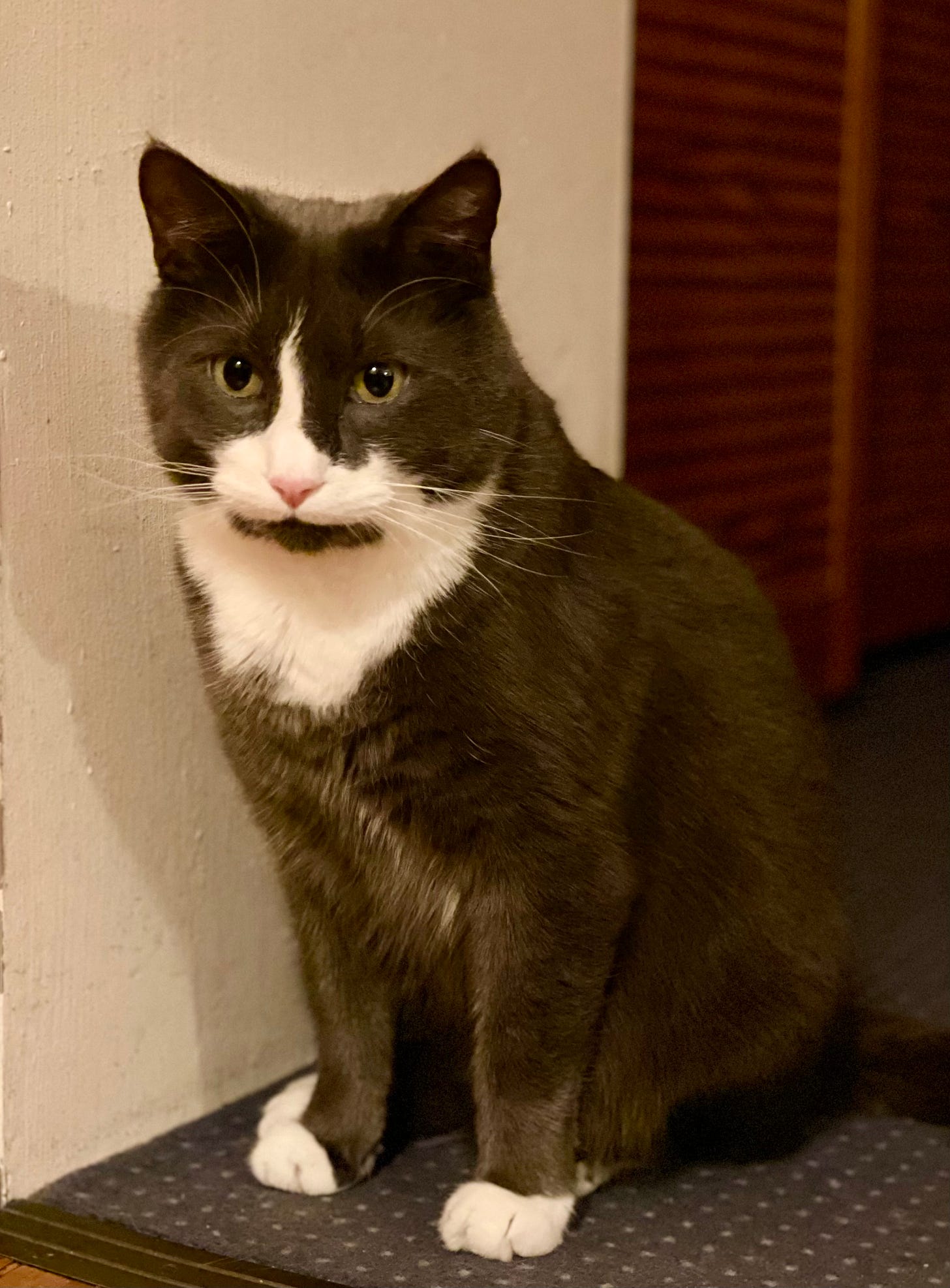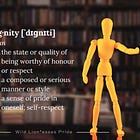Letter From Love About Dignity
Dear Unconditional Love, what would you have me know about my non-binary and lesbian dignity?

Reclaiming Dignity Through Lived Experience
Over the past year, I’ve been reflecting on dignity — not as an abstract concept, but as a vital force shaping the lived experiences of LGBTQIA+ individuals.
This exploration lies at the core of my two-part series, where I delve into its presence in cultural and legal frameworks.
In part one, I uncover its roots in Germany’s Grundgesetz — constitution and examine, how this contrasts with the dynamics in the United States.
Growing up in Germany, I often heard the phrase “Human dignity is inviolable.” It opens the German Constitution, promising equality and protection for all, regardless of identity.
Yet, living as a gender-nonconforming child, then openly as a lesbian, before discovering my true gender identity as nonbinary, I often questioned where I fit within this promise of dignity.
In contrast, the United States once appeared to lead in LGBTQIA+ rights, with visible queer movements and legislative milestones marking the decades between the 1960s and the 2000s. In recent years, however, cracks have formed in this image of progress. Cultural backlash, legislative regression, and rising hostility have exposed a deep undercurrent of resistance, threatening to erase hard-won rights for queer people, women, and workers alike.
This shift fascinates me.
It underscores a key difference: Germany’s approach, rooted in the concept of dignity, has fostered systemic protections extending beyond activism to include employment, marriage, self-determination, and even media representation. These frameworks, though imperfect, stem from the belief in dignity as an intrinsic, inviolable birthright — an idea I explore more fully in the first part of my series on dignity.
Still, understanding dignity as a legal or cultural principle is only part of the journey.
True transformation occurs when dignity is reclaimed on a personal level, embraced as something inherent simply because we exist.
Being a member of Elizabeth Gilbert “Lovelet Community” this realization inspired the Letter from Love I wrote to myself.
It reflects on how the promises of dignity have shaped and, at times, fallen short in my life, and what it means to navigate the space between societal ideals and personal truth.
Dear Unconditional Love, what would you have me know about Dignity?
Dear Sweetie,
You grew up in a world making big promises, many of which remained unfulfilled for a long time — even as laws created since 2001 have increasingly aimed to protect your rights.
The society you live in speaks loudly of dignity, anchoring it in Article 1 of your Grundgesetz (German Constitution) and declaring it inviolable — a birthright for every person. Article 3 proclaims all people are free to develop themselves, ensuring no one is disadvantaged because of their gender, origin, or other characteristics.
And yet, throughout your life, you’ve seen how often these words go unhonored.
The promises of equality, the freedom to live and express yourself authentically, sounded grand, but your experience revealed another side of this society: one still deeply rooted in outdated norms and values, shaped by generations of patriarchal and heteronormative thinking.
The values taught to you, the stories shared at school, and the political conversations at home spoke of an ideal — of democracy, justice, and humanistic education. You read Voltaire and Kant, learned about the importance of democracy, and believed dignity and freedom were core principles of this society.
But reality revealed how elusive these ideals can be.
Sweetie, isn’t it strikingly contradictory when a society grants itself values enshrined in its laws, while excluding people like you from these protective spaces?
Article 3 of the Grundgesetz ensures equality for men and women before the law, protecting against discrimination based on gender, religion, origin, or beliefs.
But where do you see yourself in these words?
Where are the terms describing people like you — diverse, nonbinary individuals? Where is your right to freely express your gender identity or sexual orientation explicitly protected?
For so long, you lived in the gap between the promises made and the reality experienced.
Since 2001, laws have offered you and others extensive protection and legal recognition.
Yet, in many rural and small-town communities, this recognition often remains an abstract idea, far removed from lived reality.
You read the words and heard the claims, while simultaneously experiencing how these rights were repeatedly denied. The same structures claiming to protect dignity often withheld it. At school, you were trained to obey and conform, not to be authentic.
Societal expectations required you to bend, hide, or surrender parts of yourself simply to survive.
And yet, here you are today, Sweetie.
Not only have you survived, but you’ve begun to see through it all.
In the past four years, you’ve unraveled the systems shaping your life — deeply embedded norms, societal structures, and inherited beliefs denying you what was always yours.
You’ve come to understand dignity is not just a legal principle. It’s deeply personal and inseparable from your being.
Even though you’ve learned to stand against resistance and systemic ignorance, your dignity was never something anyone could grant or take away.
Sweetie, I know how heavy the weight was you carried — the feeling of being overlooked, having to hide, being denied the freedom to simply be yourself. But I want you to know: Right here, right now, in this moment, you are whole.
Those words by Jon Kabat-Zinn, which have offered you support so many times, reflect the truth you are discovering more deeply within yourself:
No matter what the travails of life may have brought to the body and the mind, recognizing that you are whole and complete right now, just as you are right in this moment. Embodied awareness, or what we call mindfulness, being a domain in which our limitations and our sorrows, our losses and our hurts, whatever they might be, are not confining or defining of our intrinsic beauty, our intrinsic worthiness, our intrinsic wholeness, our intrinsic belonging, and our interconnectedness with others, with nature, with the world. Nor do our personal challenges restrict our intrinsic capacity to be of use, to help others, to contribute to healing the ills of the world in ways that might seem tiny, but may in actuality be profoundly transformative in ways both little and big. And that may ultimately help heal the wounds of society and protect our planet, our world, and all life for generations yet to come.
— Jon Kabat Zinn
These words are like a mirror, Sweetie.
They show you dignity is not something you need to earn. It’s not a reward for being good, quiet, or conforming.
Dignity is your birthright; it’s yours simply because you exist.
When Tara Brach says, “May I love and accept myself, just as I am,” she offers more than an affirmation. She offers a practice, a way to anchor dignity in your daily life.
Self-love and self-acceptance, Sweetie, remain the most profound ways to honor your own worth. They quietly and powerfully remind you of your inherent sufficiency — exactly as you are.
You’ve worked tirelessly to unmask the voices seeking to silence you. At the same time, you’ve begun listening to your inner voice, giving it space to emerge. With compassion, you’ve faced the shadows of shame and uncovered the essence within — your inner beauty, your dignity, and your unshakable sense of belonging.
Now, Sweetie, here you stand. You can feel the enormity of what you’ve reclaimed.
Your dignity isn’t something others bestow upon you. It’s a part of you, born from deep self-love.
You are whole, Sweetie.
You always have been, and you always will be.
And no matter what challenges lie ahead, this truth will carry and guide you — toward a future where your dignity shines brighter than ever before.
With endless affection,
Love
Reclaiming Dignity as a Personal Practice
In my journey toward self-acceptance, I’ve come to see dignity as more than a legal principle or cultural value — it’s a deeply personal practice.
For years, I lived between the promises of equality and the reality of exclusion, questioning my worth and place in the world as a queer, nonbinary individual. Reconnecting with my inherent dignity has been profoundly transformative.
Reflecting on the differences between Germany’s dignity-centered framework and the United States’ rights-based approach, I see how systems and culture shape our experiences. Germany’s grounding in dignity as an inviolable principle has led to laws safeguarding even those still marginalized by societal attitudes. In contrast, the US, despite its early progress, now faces a precarious balance between advancement and backlash.
For me, dignity is no longer a concept confined to constitutional texts or philosophical discussions. It’s a quiet, steady force reminding me of my worth, regardless of the obstacles or prejudices I encounter. Dignity forms the foundation of my self-acceptance and sustains me as I navigate the ongoing challenges of living authentically.
If this speaks to you, I invite you to explore the systemic and philosophical roots of dignity in part one of my series, How Dignity Transforms Shame Into Self-Acceptance. Understanding these frameworks is essential not only for individual healing but also for collective progress — because a world where everyone’s dignity is recognized and honored is a world worth building.
You are worthy, exactly as you are.
❤️ If you find this piece meaningful, consider clicking the heart at the top or bottom of the post. It helps others discover this newsletter and brightens my day.
Would you be willing to Support My Work and Subscribe as well as Contribute? It would mean so much to me!
Creating art, testing recipes, and sharing my reflections here is a labor of love, but it also comes with real costs. Since January 2024 I am on sick leave for mental health challenges. Monty and I make life workable with a disposable income of €350 / $380 a month.

I share more on my current dire situation here:
If my writing, art, and recipes resonate with you, I would be incredibly grateful if you would consider supporting my work with a paid subscription to Wild Lion*esses Pride.
And if I may ask—should you happen to know of opportunities for a cook, baker, barkeep, host, concierge, travel manager, personal assistant, house philosopher, systemic conversationalist, photographer, resident artist, or even a whimsical weather frog person—please pass along my name. I’m eager to embrace new adventures, wherever the tides of life and serendipity may lead me. I do need to live somewhere and on something after all.
Your subscription helps keep this space ad-free, reader-supported, and accessible to everyone, while also supporting the time, creativity, and resources I dedicate to this work.
If a paid subscription isn’t feasible right now, you can also show your support with a one-time tip via my Tip Jar here.
Thank you for your kindness and generosity—it truly makes a difference. Together, we’re creating a space of reflection, creativity, and connection, and I’m so grateful you’re part of this journey








What a thoughtful piece, Jay, I really enjoyed it. You added such resonance and depth to the idea of "dignity," and there was much I didn't know about the German laws which protect it, for which I am glad (even if they are imperfect, they are still better than what we have in the US). This especially from your beautiful letter from love I appreciated: "Sweetie, I know how heavy the weight was you carried — the feeling of being overlooked, having to hide, being denied the freedom to simply be yourself. But I want you to know: Right here, right now, in this moment, you are whole." I see you, you ARE whole. Wishing the very best for you, Jay!
I read this essay with great interest. I appreciate your sharing of the agony of living "in the gap between the promises made and the reality experienced." It is absolutely not easy. As a second-class citizen, I can relate to that feeling, even though our struggles may be of a different nature.
It is amazing how Germany has enshrined "dignity" into its constitution, and I like your statement that dignity is our birth right. I agree with that 100%.
The problem with the American Constitution -- mainly, the way people interpret and apply it today, is that the "pursuit of happiness" is touted as the highest goal of life and an unquestioned quest of ALL people. Well, it may be true in one sense, but when everyone is out pursuing their happiness (open to interpretation), the part about sacrificing for the common good when such pursuits clash with one another is lost. Whereas, dignity is something that is unarguably a birth right and the desire of every single person who is born, regardless of their background.
Imagine a government established on this principle AND actually ensuring people of ALL backgrounds will live in dignity? We are definitely not there yet, but it doesn't mean we can't dream of one and work toward it. We can start with our own social circles.